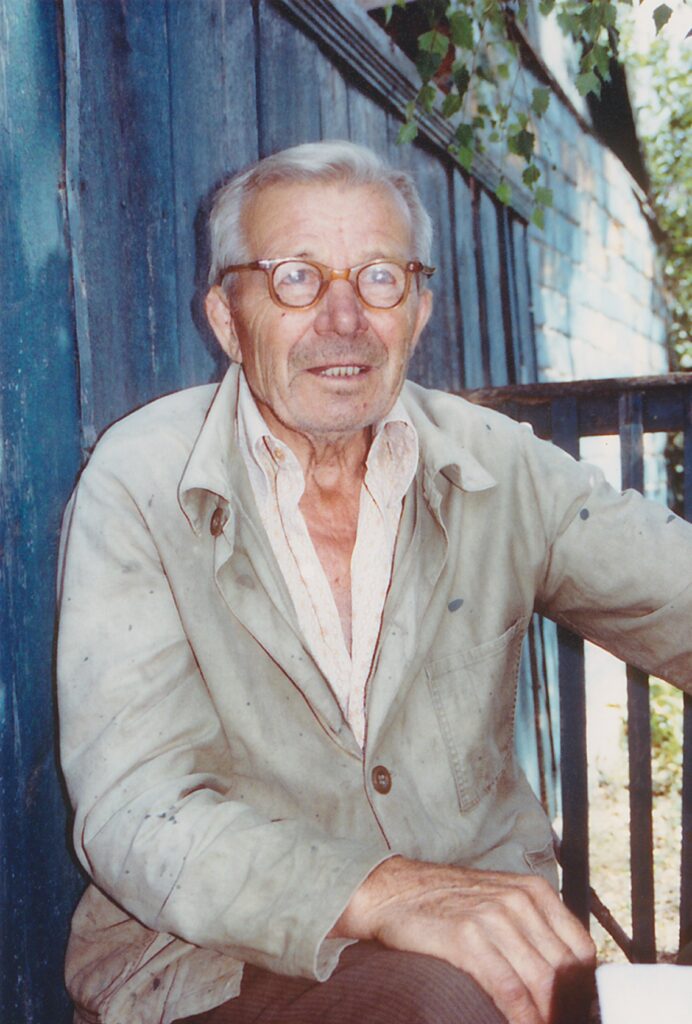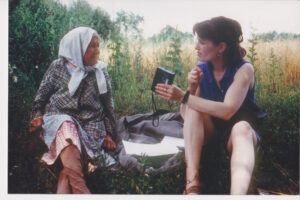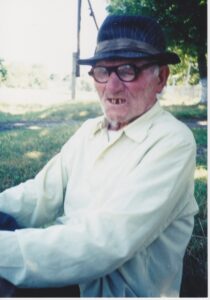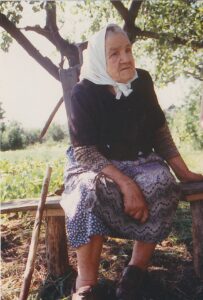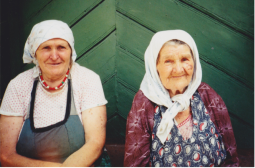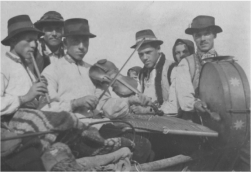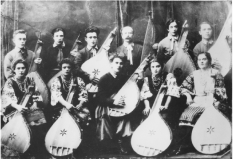Kravchenko Fedir Yosypovych, b. 1915
Fedir Yosypovych Kravchenko (Kharkiv region)
—Did you perform in the club?
Fedir Yosypovych: No, we didn’t have any clubs.
—What about the reading house?
Fedir Yosypovych: There was a reading house here in the office. Meetings were held there and people came to read, too. There were three rooms: the accountant’s desk was in the large one (they had a locker for the papers and such), Maria Hnatovna lived in the second room (she was poor), and the small hallway was for smoke breaks.
…………………………………………………………………………………
—When was the club built in Zolocheve?
Fedir Yosypovych: This club was built after the war. The church was dismantled after the war and used as a warehouse. Little by little they took it apart completely and built a club here. I don’t remember what year it was.
…………………………………………………………………………………
—Did you go to the concerts in the club after the war?
Fedir Yosypovych: Yes.
—What concerts were there?
Fedir Yosypovych: All kinds. People sang and danced.
—Did the bandura ensembles come from Kyiv or Kharkiv?
Fedir Yosypovych: Some would come from Kharkiv or other places. There were also local ensembles, many good ones.
—Did you have bandura players in your village?
Fedir Yosypovych: I don’t remember.
Fedir Yosypovych Kravchenko (Kharkiv region)
—When you were little, did startsi come to your village?
Fedir Yosypovych: Yes, they did, and they would continue to come for a long time, even when I was married. Some just pretended to be a starets. I remember one who was almost an adult man who used to tie his hand like this and put on a coat in winter. One time, he came to my neighbor’s house while I was there. She gave him something, and when he set out to go to my house, I said, “Don’t go there. No one is home in that house.” He said, “I’m not asking you.” I said, “I’m telling you because I am the owner of that house. There’s no one there, and I won’t go with you there now.” He said again, “I won’t ask you.” I grabbed him by the shoulders, “Walk the other way.” He left, but I saw that he went in the direction of my house, so I followed him because my house was not locked. Just as soon as he entered my house, I took him outside, and the blood was bright red on the snow for a long time. I didn’t hit him right away. I said, “Take off your coat.” — “I won’t be able to put it back on.” — “I will help you put it on.” I was told that he had both arms but he was telling people that he didn’t have one of them. My mother would always give alms. It was not acceptable in our family not to help someone in need. I undressed him and saw his hand. He said, “People would not give me anything [if they saw that I am not disabled].” Then I gave him a good beating.
—Was he from your village?
Fedir Yosypovych: No, he was from somewhere else.
—Were there any startsi in your village?
Fedir Yosypovych: No.
—The ones that you remember: were they men or women, the blind or the disabled?
Fedir Yosypovych: They were various people, and there were many of them. There were good people and old people among them. One would often come to our house. Well, he went to those who were richer. He would continue going to the people who had given him something before. He wouldn’t come again to those who didn’t give him anything.
—Did they play any musical instruments?
Fedir Yosypovych: No.
—Did they sing?
Fedir Yosypovych: No, they would just come and ask for alms. They would apologize and sometimes ask to spend the night if it was late. Our people didn’t mind.
—Was it considered a sin not to give alms to a starets?
Fedir Yosypovych: Yes.
—Did your mother tell you to give a starets alms if she was away and a starets came asking for alms?
Fedir Yosypovych: Yes. My parents were performers, and people often invited them to parties. I lived my life that way, too. If someone was having a party somewhere, they would call me.
—Did you sing?
Fedir Yosypovych: I sang well, and I would take those who did not behave well at the parties to the garden and I’d punch them, saying, “People invite you to their party to have a good time, not to give orders. You get it?” When a fight was starting at my wedding, I said, “I made a bed in the barn. Go there and sleep. When you wake up, you can come back to the table. If you don’t do this, you will never again come near my door.” They feared me.
—Did you see any startsi who played musical instruments at the market?
Fedir Yosypovych: I saw some. One wore a bubon across his shoulder. He’d pull a string and the bubon would sound while he was playing the fiddle.
—How did the fiddle look?
Fedir Yosypovych: The same as now.
—When was this?
Fedir Yosypovych: Before collectivization.
—Did the startsi come after the war?
Fedir Yosypovych: Yes. Many of the dispossessed people would come asking for alms. The young ones were not given any work, and the old ones were not good for work, so they would go around asking for alms.
Fedir Yosypovych Kravchenko (Kharkiv region)
—Did your mother get paid for her weaving work?
Fedir Yosypovych: I’m not sure; I think people used to pay. None of us worked anywhere else; we didn’t have much land after it was divided. We had five hectares. During collectivization, we were classified as rich, but the land didn’t allow us to be rich. There wasn’t enough of it and the quality of the land was poor; it wasn’t even. Someone from the regional administrative center told my father to join the kolhosp to avoid the hatred and persecution.
—We looked through the archives of the kolhosp meeting minutes regarding dispossessions and found one last name: Kravchenko K.F. Who was it?
Fedir Yosypovych: It’s probably Kyrylo Fedorovych or Fedosovych. His nickname was Vukhnal and his last name was Kravchenko.
—Was he considered a kurkul?
Fedir Yosypovych: Not a kurkul. He was thrown out of his house, and his house was used as a kolhosp administrative office. They also had a barn and a warehouse there.
—Was he deported?
Fedir Yosypovych: No, he disappeared somewhere, but he wasn’t sent far because he was old, but his son Yosyp Kyrylovych lived nearby. If you had been to the edge of Zrubanka, the poorest house there was his. On the other side behind the fence, was the house of this old man [K.F. Kravchenko]. Then they wanted to throw him and his son Yosyp Kyrylovych out of the house, too; he worked in transportation. Those lazy ones that used to search the houses wanted to chase him out, but still can’t do it.
…………………………………………..…..……………..…
—Who was the head of the kolhosp?
Fedir Yosypovych: Kuzma Afanasiiovych Kalaida.
—Who was Kotliar?
Fedir Yosypovych: Semen Prokopovych Kotliar.
—He was the chair of the convocation.
Fedir Yosypovych: Possibly.
—Was Kalaida poor?
Fedir Yosypovych: He was such a pauper. His house is still standing on the other end of the village. He later swiped houses with one man who knew that there’d be evictions. He moved from Zrubanka to Sortirovka. His house was made of straw while the pauper’s [Kalaida’s] was covered with iron. This is why he went for an exchange. That man had a large yard and nothing else—just a house and a toilet. He had no other property anywhere and many children. After they exchanged houses, that man removed the roof and sold the rest (he needed the iron); then he fled to Sortirovka and wasn’t subject to eviction and deportation.
—Could it be that Kalaida told him to flee?
Fedir Yosypovych: No, the regional administrative center knew better. The people who worked there used to be landowners back in the day. They knew what was coming.
…………………………………………..…..……………..…
—Was the representative of Zolochivska village council named Zaitsev present at this meeting?
Fedir Yosypovych: I don’t remember this one.
—They said the kurkuli should be expelled from their houses and then Hnatchenko’s wife stood up…
Fedir Yosypovych: Maria Ivanivna Hnatchenko. She is dead now.
—She said Kravchenko was a good man who used to help the poor. He should not be expelled.
Fedir Yosypovych: Yes, my father was good to all the people. She lived close to us, and if she didn’t have enough to eat, she’d come to our place, asking, “Give us some, give us some.” When she came, she used to help around the place with the work.
—Then Khrystenko spoke to support Kravchenko, and Kalaida said that Kravchenko was mean and stole from his mill during the famine. Did he mean the famine of 1921?
Fedir Yosypovych: Kalaida didn’t have a mill. My father used to go to the mill that belonged to the kolhosp. It was at Kyryl Fedorovych’s house, but it stayed in the kolhosp property. My father learned quickly how to use it; not everyone could. My father used to reproach them for not sowing properly. Then Kalaida complained to the regional administrative center and asked to expel my father from the kolhosp because he was harming their work. In 1932, he was expelled from the kolhsop. My mother and he used to work in the kolhosp. In 1930, when the kolhosp was set up, I went to study in Kharkiv. I studied in a special school that taught carpentry and cabinet-making. I studied there for six months. When I finished school, the building for Hazprom [Hazova promyslovist—a department overseeing natural gas projects] was just being built there, so I worked there for a while. Then in early 1931 the turbine plant was built, and I was transferred there along with the whole brigade. I was young, and my uncle was the chief of the brigade. I wasn’t lazy, and I was respected at work. Then from cabinet-making I went into steel fixing until the end of the construction project (I was installing rods on the roof). Then one man from my brigade fell at work and died; I got scared and left the turbine plant for good.
—When your parents left the kolhosp, where did they go to work?
Fedir Yosypovych: They were expelled from the kolhosp and came home with a bond certificate for one thousand rubles due in 24 hours. This was in 1932; one bond due today in 24 hours; next bond due tomorrow in 24 hours, and so on without end. We had some cash saved in the barn. I said, “Father, you’ll need to pay one thousand every day.” I worked at Malyshev plant at the time. (I wasn’t accepted because I was too young, so I used my older brother’s documents and worked under his name as Stepan. When they started introducing the passports, I quit, got my own documents, and went back to work under my own name. I worked in the foundry and earned 1,100 or 1,200 per month.) So, I said to my father (because I was getting paid once a month and he had to pay the bonds every day), “Dad, you know what? Don’t pay the bonds. You don’t have any small children. Let them evict you from the house; let them do what they want. We’ll go to another village somewhere near Kharkiv and buy a homestead with the money that we have saved. You won’t be considered a kurkul and no one will bother you.” He agreed and did not pay the bonds. The bonds were there probably for the whole week; then they took them away. We still had a cow and a pig for six months but were forbidden to slaughter the pig. The cow was good; it could have probably calved in a month. Then came Kalaida and Shalaidyshchev to confiscate the cattle. My father had already prepared the feed for the pig (ground seeds and beans); it was one- and-a-half years old and they didn’t allow us to slaughter the pig.
—Did your father want to slaughter the pig?
Fedir Yosypovych: Yes, for a long time he had nothing to feed it with. Then they came to evict us from the house. Our house was in the garden, and a window was open. They took the cow, and the pig was still inside. My father and I started singing; I don’t remember which song, but we loved to sing. And Kalaida said, “Look, they are singing!” A month later, they told him to join the kolhosp again because there were not enough workers. So, my father joined the kolhosp again.
…………………………………………..…..……………..…
—When did the word “kurkul’” come into usage in your village? When your grandfather was working, was he called that, too?
Fedir Yosypovych: No-no, not at that time. The word came into usage during collectivization—a prosperous kurkul, high class, low class.
—What does the word “kurkul” mean?
Fedir Yosypovych: The rich one.
…………………………………………..…..……………..…
—Were many people evicted in your village?
Fedir Yosypovych: Yes. One old man named Smetana was thrown out of his house and disappeared somewhere. Then he came back and built a little house, but the previous one was taken away from him along with all the farmstead.
